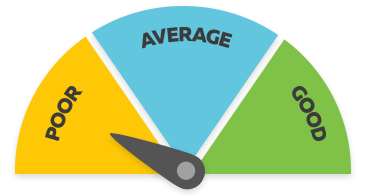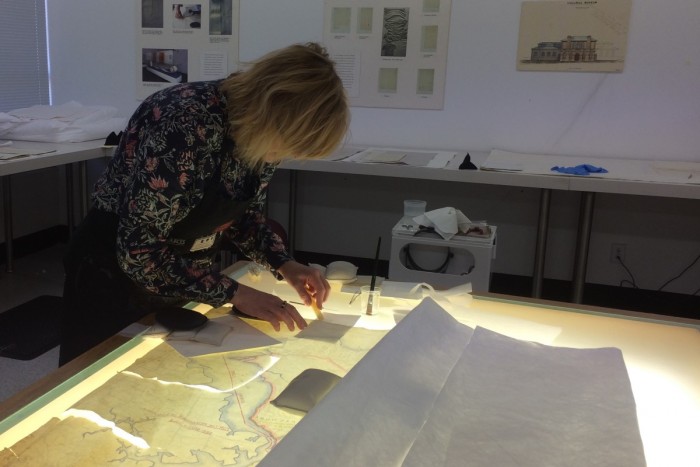Conservator
Kaiatawhai Whakaora Taonga
Conservators help preserve art and other important historical items by preventing deterioration and repairing damage.
Pay
Conservators with one to five years' experience usually earn
$55K-$70K per year
Conservators with more than 10 years' experience usually earn
$70K-$82K per year
Source: Museums Aotearoa, 2018.
Job opportunities
Pay
Pay for conservators varies depending on experience, the type of organisation they work for, and whether they work full time.
- Full-time conservators usually start on $55,000 a year.
- With five years' experience, they usually earn $55,000 to $70,000.
- Those with 10 or more years' experience may earn $70,000 to $82,000.
A third of conservators are self-employed and their income depends on the success of their business.
Source: Museums Aotearoa, 2018.
(This information is a guide only. Find out more about the sources of our pay information)
What you will do
Conservators may do some or all of the following:
- research the history of artworks and items such as ngā taonga tūturu (old Māori objects)
- analyse and test items to determine what they are made of, their condition, and how authentic they are
- consult curators, owners and iwi about how to treat items
- repair and preserve items using physical and chemical treatments
- document items' conditions and any conservation work done
- advise other staff or collectors on preserving, storing, displaying and transporting items
- keep up to date with new developments in conservation.
Skills and knowledge
Conservators need to have an understanding of:
- different approaches to the conservation of objects
- conservation principles and ethics
- the chemistry of materials and how to use chemicals safely
- ngā taonga Māori (treasured Māori items).
Conservators also need to have specialist knowledge in their area of interest, and a commitment to ongoing education.
Working conditions
Conservators:
- usually work regular business hours, but may sometimes work longer hours to meet deadlines
- work in private studios and labs at museums and galleries
- work in conditions that may be hazardous, as they work with poisonous chemicals
- may travel to visit marae and private collectors
- may travel internationally to accompany art works being exhibited around the world.
What's the job really like?

Anna Whitehead
Conservator
Preserving crumbling treasures
Conservator Anna Whitehead preserves historic government documents that may be literally falling apart.
"With these, and every item we work on at Archives New Zealand, we do an assessment. Can it be handled? Repaired? Repackaged? Should we do anything at all? How should it be stored?
"We have burnt files – every time they are handled, bits of the charred edges fall off. These are prime candidates for digitisation."
Keeping up to date is vital
"There are always new things to keep up with.
"For instance in my first job they had a fumigation chamber – it was routine to use a chemical that has now been banned."
Safeguarding New Zealand history
"Working on He Tohu has been my career highlight – learning about the Māori connection to these priceless documents [He Whakaputanga – Declaration of Independence of the United Tribes of New Zealand; Te Tiriti o Waitangi – The Treaty of Waitangi; and the 1893 Women’s Suffrage Petition].
"I feel very responsible but I try not to be stressed about their value. The documents have so much history. Previous storage and treatments have changed them and we must take care to preserve what there is.
"We used our judgement to decide that we wouldn't change anything – most important is how they are kept in the exhibition, where they will be for 25 years.
"So we specified that they were to be temperature and humidity-controlled, and once a year we assess them to make sure the light isn’t fading them."
Photo: Mark Beatty, National Library of New Zealand, ATL Imaging Services.
Entry requirements
To become a conservator you need a tertiary qualification in conservation (only available overseas). Employers increasingly prefer candidates with a Master of Arts in conservation.
To enter postgraduate training, you need an undergraduate degree in a subject such as:
- cultural heritage studies
- archaeology
- art
- anthropology
- organic chemistry
- science
- fine arts
- art history.
Specific conservation qualifications only available overseas
The closest conservation qualifications are offered in Australia – a Bachelor's degree at the University of Canberra and a Master's degree at the University of Melbourne.
Other overseas universities also offer conservation qualifications.
- University of Canberra website - Bachelor of Arts (Culture and Heritage)
- University of Melbourne website - Master of Cultural Materials Conservation
Secondary education
A tertiary entrance qualification is required to enter further training. Useful subjects include English, chemistry, history of arts, history and classical studies, te reo Māori, processing technologies, and painting, sculpture, photography, printmaking combined.
Personal requirements
Conservators need to be:
- patient and detail-oriented
- methodical and organised
- accurate and careful, with good judgement as much of their work involves handling irreplaceable items
- passionate about their work and the art or items they're responsible for
- good researchers, with analytical skills
- good writers and communicators
- skilled in solving problems and negotiating.
You need good negotiation skills, and to understand people's needs. You have to be sensitive when someone says something was their great-great-grandmother's – that gives it importance.

Carolina Izzo
Managing Director, Head Conservator
Useful experience
Useful experience for conservators includes:
- creating art or making craft items
- volunteering or working in museums, art galleries or libraries
- conservation technician work
- experience relevant to their speciality, such as photography for photographic conservators.
Physical requirements
Conservators need to have good eyesight (with or without corrective lenses), good colour vision and good hearing (if they are working with sound recordings). They also need a good level of fitness and strength, as their work may involve lifting heavy objects.
Find out more about training
- The Australian Institute for the Conservation of Cultural Material (AICCM)
- www.aiccm.org.au
- Ministry of Culture and Heritage Manatū Taonga
- (04) 499 4229 - info@mch.govt.nz - www.mch.govt.nz
- Museums Aotearoa
- (04) 499 1313 - mail@museumsaotearoa.org.nz - www.museumsaotearoa.org.nz
- New Zealand Conservators of Cultural Materials (NZCCM) Pū Manaaki Kahurangi
- www.nsccm.org.nz
What are the chances of getting a job?
Conservator opportunities scarce
Opportunities for conservators are very limited due to:
- the small size of the occupation, with fewer than 100 positions in New Zealand
- conservators tending to stay in the same job for many years, which limits the number of vacancies that come up
- high competition for any vacancies that do arise.
According to the Census, 87 conservators worked in New Zealand in 2018.
Internships and volunteer work offer a foot in the door
It's a good idea to approach museums or galleries directly to see if you can get:
- volunteer work or internships with conservators
- short-term contract work as a conservation assistant or technician.
These can lead to conservator work later.
Many conservators gain experience by working overseas before returning to New Zealand to work.
Most conservators work for museums or art galleries
Most conservators work for large museums or art galleries. They may also work for:
- heritage libraries (libraries that hold historic documents and materials)
- archives
- historical societies
- private businesses that specialise in preserving and restoring paper, furniture, paintings or other art objects.
A third of conservators are self-employed and work on short-term contracts at different institutions.
Sources
- Ministry of Business, Innovation and Employment, '2006-2014 Occupation Data' (prepared for www.careers.govt.nz), 2015.
- Stats NZ, '2018 Census Data', 2019.
- Tocker, P, executive director, Museums Aotearoa, www.careers.govt.nz interview, July 2018.
(This information is a guide only. Find out more about the sources of our job opportunities information)
Progression and specialisations
Conservators may progress to set up their own conservation business, or move into management, sole-charge positions or consulting.
Conservators can specialise in working with:
- paintings
- paper and books
- sculptures and objects
- ngā taonga tūturu (old Māori objects)
- photographs and digital media
- textiles
- buildings
- time-based media (backup, duplication and conservation of digital files and materials).
Last updated 8 September 2023


